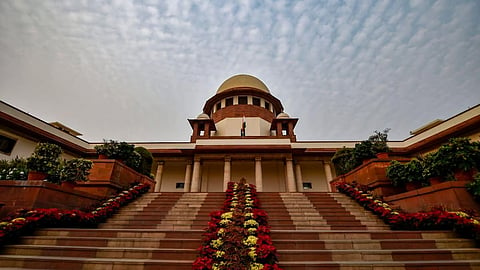

NEW DELHI: The Supreme Court on Tuesday passed a slew of directions in the suo motu criminal writ petition of 2021 concerning the strategy for granting bail, as it held that the states and union territories had an obligation to consider the premature release of all convicts and it was not necessary for them to apply for permanent remission.
Earlier some states, on the pretext of the accused not filing the appeal, has unnecessarily delayed bail or remission and certain pleas of the accused.
A bench of Justices Abhay S Oka and Ujjal Bhuyan directed states and union territories not having a remission policy under Section 432 of the CrPC or Section 473 of the BNSS to formulate a policy within two months.
The top court, while going one step further, in favour of the accused persons, held that without hearing the accused, remission cannot be cancelled by the state.
The two-judge Bench added that remission of a convict's sentence should not require an application from the accused, as the State must consider such cases suo motu.
"The remission cannot be revoked arbitrarily without proper reasoning and due process," the top court said, adding that it will later assess their implementation by the authorities.
The government concerned had the power to incorporate suitable conditions in an order granting permanent remission and consideration of various factors was necessary before finalising the riders, the bench observed.
"The conditions must aim at ensuring that the criminal tendencies, if any, of the convict remain in check and that the convict rehabilitates himself in society. The conditions should not be so oppressive or stringent that the convict is not able to take advantage of the order granting permanent remission. The conditions cannot be vague and should be capable of being performed," it said.
Observing the order granting or refusing permanent remission must contain brief reasons, the apex court said it should be immediately communicated to the convict through the office of the prison. The copies should be forwarded to the secretaries of the district legal services authorities concerned, it added.
The court said it was the duty of the prison authorities to inform the convict of his right to challenge the order rejecting remission.
"An order granting permanent remission cannot be withdrawn or cancelled without giving an opportunity of being heard to the convict. An order of cancellation of permanent remission must contain brief reasons. The District Legal Services Authorities shall endeavour to implement National Legal Services Authority SOP in its true letter and spirit," said the bench.
The Bench also directed, "In cases where the undertrial or convict requests that can furnish bail bond or sureties once released, then in an appropriate case, Court may consider granting temporary bail for a specified period to the accused so that he can furnish bail bond or sureties. If the bail bonds are not furnished within one month from the date of granting bail, the concerned Court may suo moto take up the case and consider whether the conditions of bail require modification or relaxation."
The district legal services authorities should also monitor the implementation of conclusion as recorded, it added.
The legal services authorities, the court said, should maintain the relevant date of the convicts and whenever they were eligible for a consideration for a grant of premature release, they should do the needful.
The legal services authorities should create a portal on which such a data could be uploaded on a real-time basis, it added.
The court directed for a copy of its judgment to be forwarded to the National Legal Services Authority which in turn would forward the same to the legal service authorities of the states and union territories to enable them to monitor implementation of the directions issued under this judgment.
(With inputs from PTI)